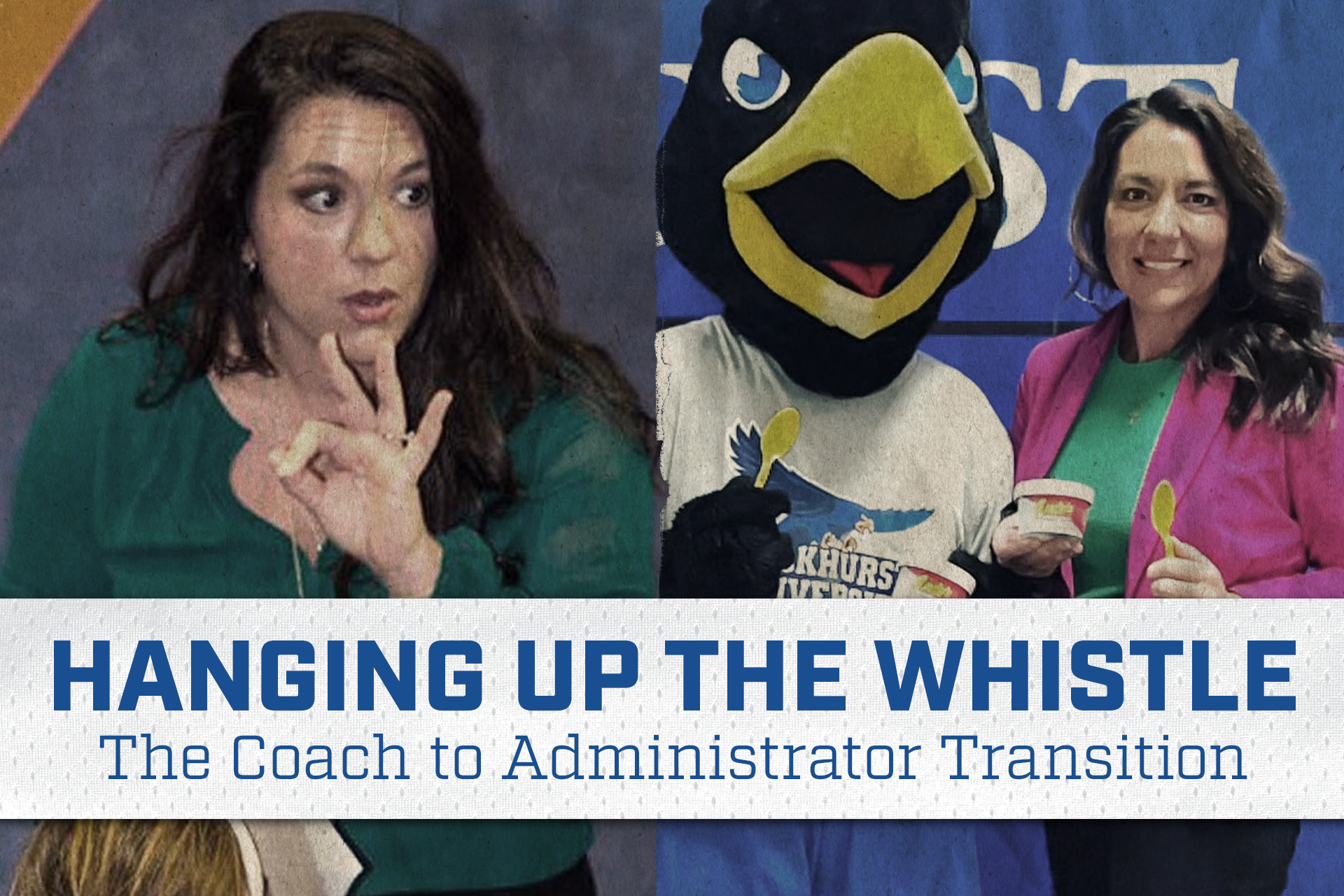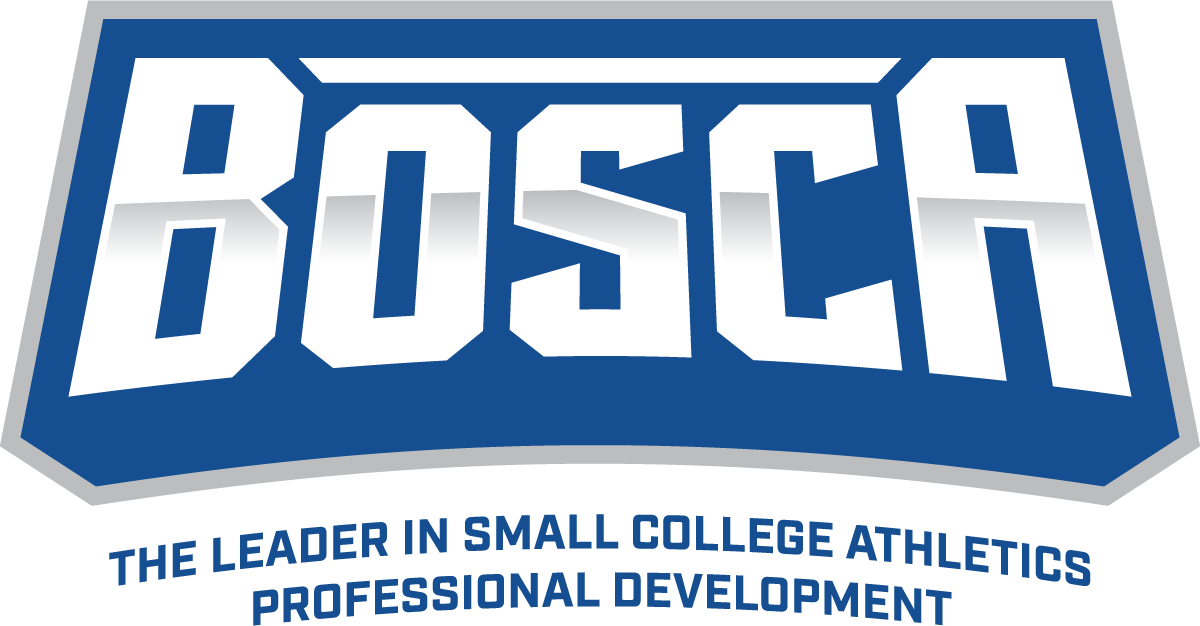Hanging Up the Whistle...The Coach to Administrator Transition
Insights from BOSCA Board Member Kristy Bayer, Athletic Director - Rockhurst University

When you coach, it is a part of you. It consumes you. Your family experiences the ups and downs with you. Your entire life revolves around the stage you are in the calendar related to your season; championship season, recruiting season, camp season, etc. While it shouldn’t be this way, your self-worth is measured by your team’s success. What happens when you are no longer a coach? When you cut that tie? When you don’t have a season or game to prepare for? When you are no longer Coach Bayer?
It was my second to last season at Arkansas Tech. We had pretty consistent success over the last decade. I knew how to win there. I found the formula. Things were good. But I wasn’t excited anymore. Sure, I was excited on game day, and after a victory, but the rest of coaching didn’t excite me anymore. We were driving back from the middle of nowhere Arkansas, after a conference victory. I was scrunched up on the front seat of the bus trying to find the “perfect position,” which by the way, does not exist. The air conditioning was dripping on me. I was positioned right next to the team trash bag. And at that moment, I was ready to be done.
I will explore three phases of the coach to administrator transition. The Decision, The Preparation, The Aftermath.
The Decision
Some of us leave on our own. Some of us are asked to leave. Regardless of how the decision is made, you mentally have to prepare yourself for a feeling of loss. I had a routine at Arkansas Tech for 14 years. That was my court, my locker room, my fellow coaches, my office. When you leave coaching, you give that to someone else. But what you have to remember was that was never yours. There were people before you. There will be people after you. You were a placeholder for a period of time, and hopefully you left a lasting impression and gave student-athletes the experience that they will carry with them for a lifetime. The hardest thing to realize is that everything and everyone MOVES ON. When I go back to Arkansas Tech, most of the students and staff don’t know me. And that is okay. You have to be okay with walking away and knowing this upfront. I was fortunate because I took another job, on another campus, out of state. I tried to cut the connection because it was best for the future of the program and new coach transition.
When do you know you are done and aren’t reacting to a tough loss, player related issue, or frustration with recruiting? I started to have a feeling of indifference with every upcoming phase of the year. I loved championships but didn’t like anything in between. I started to feel like my life was one long Ground Hogs Day. I loved my players and institution, but I wasn’t passionate about every phase of the year. As a coach, you have to be passionate about preparation and training. Major red flag – I didn’t enjoy practice anymore. So I waited for the right time and right opportunity, and it came along shortly after.
The Preparation
At the age of 25, I took the head coaching job at Arkansas Tech. I always knew I wanted to eventually be an athletic director. With that professional vision in mind, I prepared myself as well as I could professionally for when that time came. I had 15 years to work on my skillset. While no one is truly ever ready, I wanted to make sure I did everything within my control to ensure I was adequately prepared. I served as Senior Woman Administrator and Associate Athletic Director during my time as a head coach. I was able to gain valuable administrative experience to prepare myself for my coaching retirement. Even if you don’t have an administrative title, while you are coaching, you can also build your administrative arsenal.
My strongest piece of advice is to serve on committees. This can be within your coaching group, governing body (NAIA, NJCAA, NCAA), campus, or even within your living community. This is more than a space filler on your resume. You will expand your network, while gaining valuable knowledge about your organization.
Let your current athletic director know that you want to build your athletic administrative portfolio. He/She can help direct you to future opportunities. I was fortunate enough to have two ADs who greatly supported my ambitions, Steve Mullins and Kent Weiser. They directed me to leadership programs, allowed me to represent them at campus meetings, and encouraged me to participate in conference business. They helped me be strategic about my path to the AD chair.
As I was preparing for the AD interview, I was discouraged because I didn’t have a lot of fundraising experience. I mentioned this to Tim Selgo, a DII legend and my former AD when I played at Grand Valley. He said, “What do you mean you don’t have fundraising experience?! You were a successful head coach for 14 years. Your recruiting is your fundraising. You have years of experience.” You can sell. You can speak in front of groups. You can persuade people. This is an underrated skill, that is greatly transferable to external roles in athletics.
The Aftermath
You have left your coaching career behind. How do you make the best of your career as a “recovering coach?”
I learned quickly that it is easier to maintain a healthy, active lifestyle as a coach. Three hours of your day was devoted to being active in practice. Your schedule may not be as rigid as a coach, so you have the flexibility to squeeze in a workout. As an administrator, you can log more desk time. I learned this lesson the hard way. Commit to substituting that active practice time with a workout. Walk during your lunch. Get an Apple Watch, so it can tell you to move/stand.
You will need to adopt a mindset shift. As a coach, you were an advocate for your players, budget, court time, and everything necessary for your team to be successful. As an administrator, not only do you look out for the entire department, but your decisions and actions need to be in the best interests of the entire university. You don’t have a singular domain anymore. You need to contribute to the collective good of university operations.
One of the more difficult practices for me was to take off my “coaching lens.” As an administrator, I initially was quick to side or support the coach. While I still feel empathetic and supportive of our coaches, as an AD, I have learned to get everyone’s perspective and to see situations from a non-coaching viewpoint. My coaching background is an asset when trying to relate and understand coaches, but I have had to check myself early on in my career, so that asset didn’t turn into a liability.
Still today, people ask me if I miss coaching. I feel fultilled as a coach. I accomplished what I wanted to and have many wonderful memories and relations. But, no, I do not miss it. What I learned as a coach serves me well as an administrator today. Coaching is a hard road, but it is one of the most worthwhile and rewarding professions one can be privileged to have. I have found that being an athletic director provides it's own set of challenges and rewards as well. Your path may forever lie in coaching or you may be deciding your next step. You may have transitioned out, but in your heart, mind, and body, you will always be a coach.

